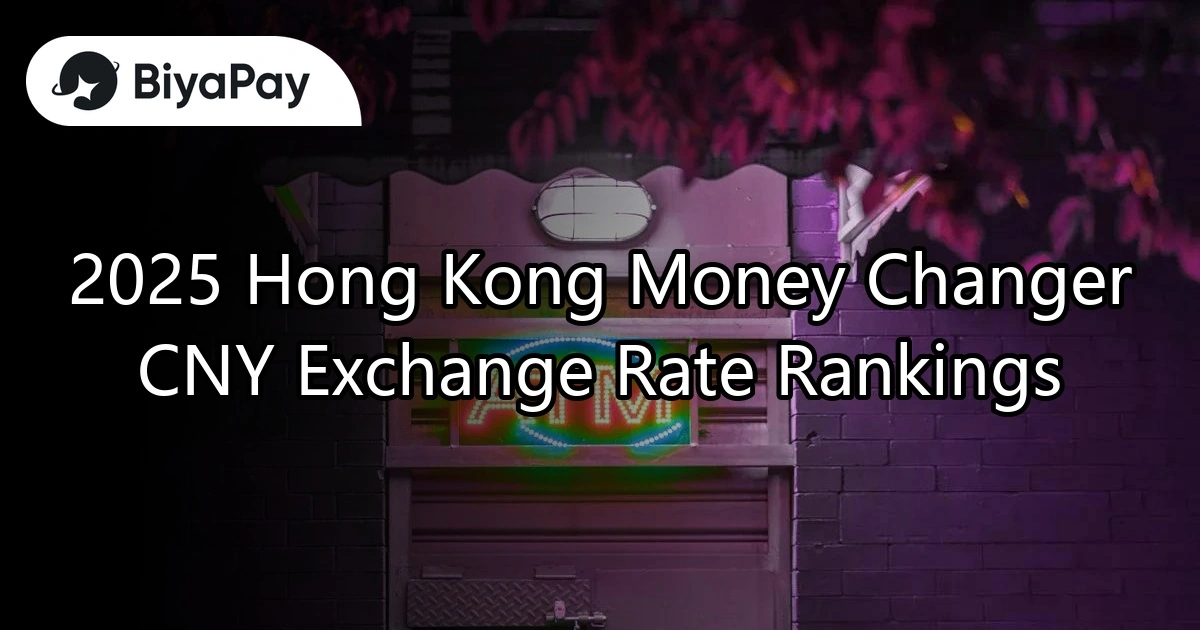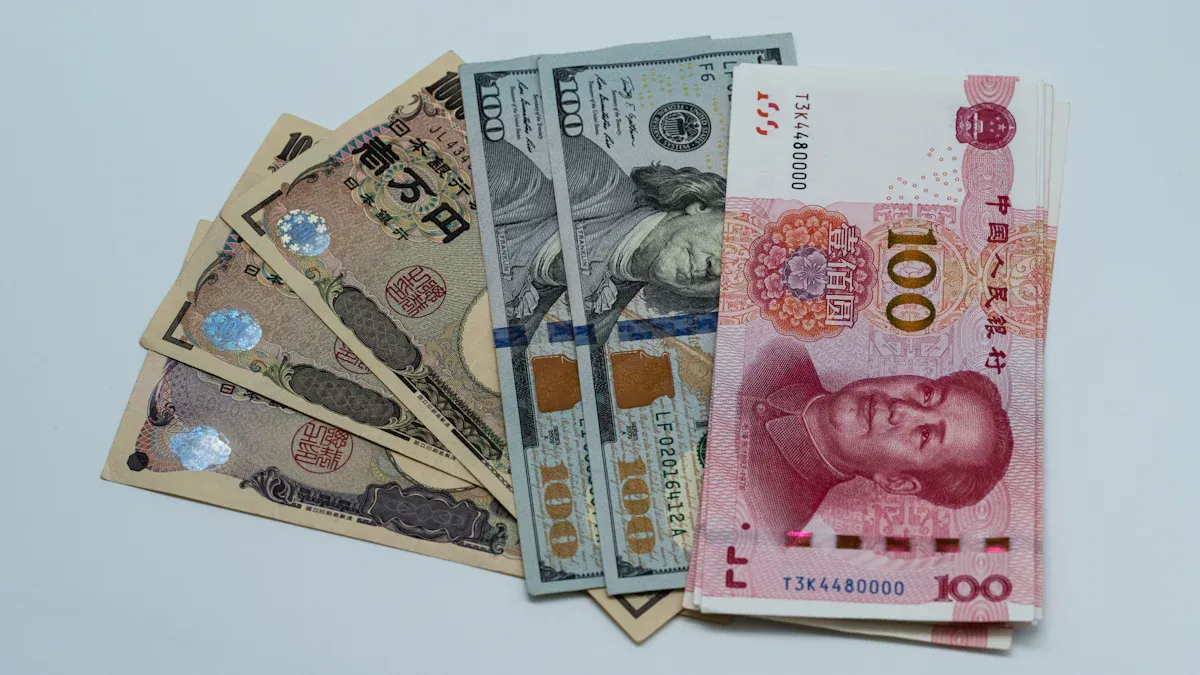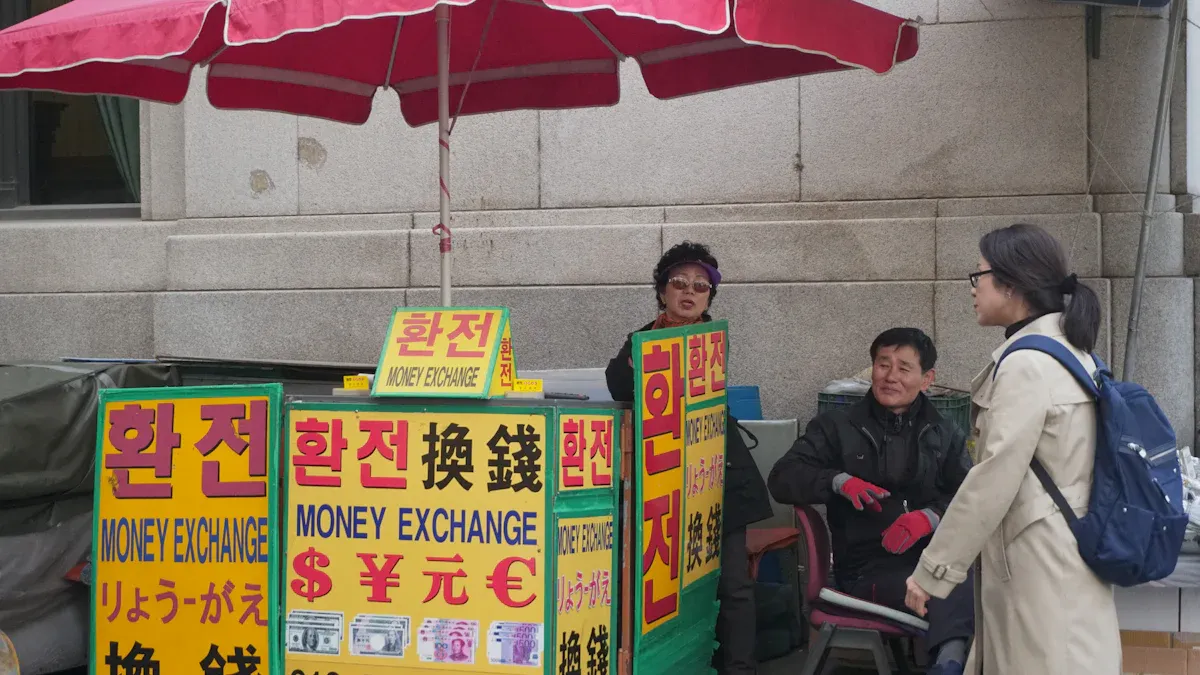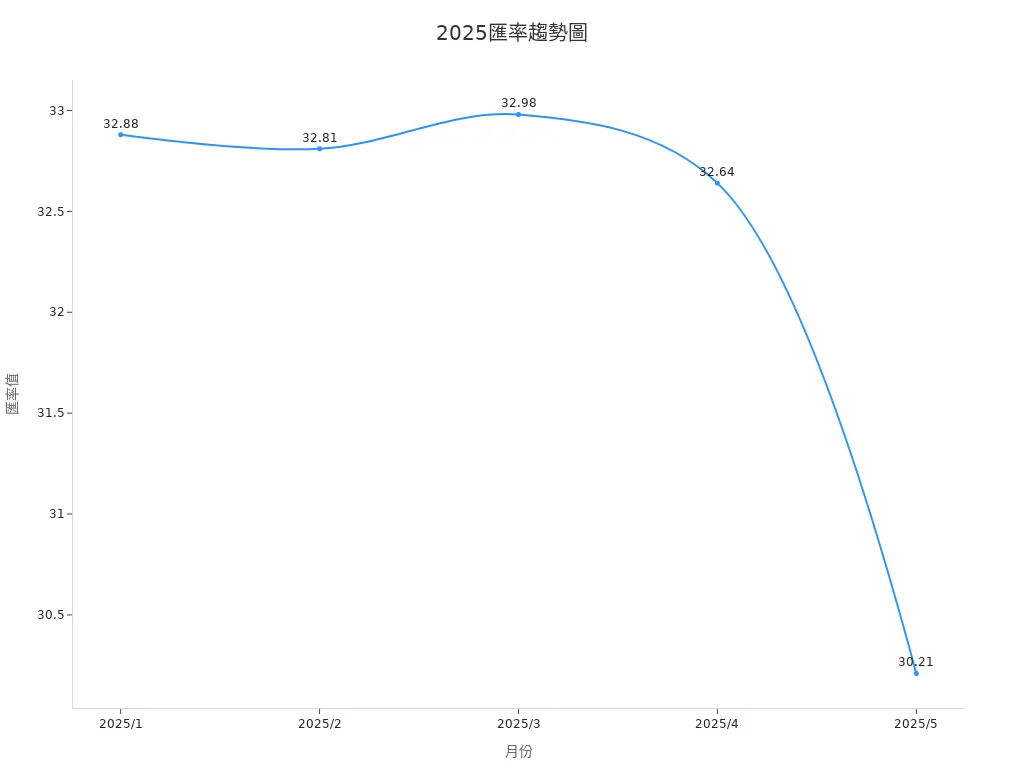- EasyCard
- Trade
- Help
- Announcement
- Academy
- SWIFT Code
- Iban Number
- Referral
- Customer Service
- Blog
- Creator
2025 Hong Kong Money Changer CNY Exchange Rate Rankings

Image Source: pexels
When you want to exchange CNY, you should first compare the cash exchange rates of major money changers and Hong Kong banks. Below is the 2025 CNY exchange rate ranking for major money changers and banks (using 1 USD to CNY as an example):
| Money Changer/Bank | Cash Exchange Rate (USD/CNY) | Best Rate Indicator |
|---|---|---|
| Kin Shing | 7.32 | ⭐️ |
| Ngau Kee | 7.30 | |
| Little Girl | 7.28 | |
| Fat Tat Bird | 7.27 | |
| Tung Lee | 7.25 | |
| Wai Kit | 7.24 | |
| Flying Bird | 7.23 | |
| King Chi | 7.22 | |
| Sang Sang | 7.21 | |
| Bank of China (Hong Kong) | 7.15 | |
| HSBC | 7.13 | |
| Hang Seng | 7.12 | |
| Bank of East Asia | 7.11 |
You will notice that money changer exchange rates are generally more favorable than those of Hong Kong banks. Exchange rates fluctuate daily; for instance, the New Taiwan Dollar appreciated by 6.98% in May 2025, driving a significant increase in exchange volumes. You should check the latest CNY exchange rates before exchanging to reduce costs.
Key Points
- CNY exchange rates at Hong Kong money changers are generally more favorable than at banks, and choosing a money changer with a higher rate can save on exchange costs.
- Exchange rates fluctuate daily, so it’s recommended to use mobile apps or online platforms to check real-time rates to ensure you get the best price.
- When exchanging CNY, you need to prepare identification documents and be aware of the minimum exchange amounts and payment methods at money changers.
- Choose licensed and reputable money changers, avoid remote locations, and verify cash and note authenticity on the spot to ensure exchange safety.
- Comparing rates from different money changers and banks and flexibly adjusting your exchange strategy can help reduce costs and improve asset allocation efficiency.
CNY Exchange Rate Comparison

Image Source: pexels
Ranking Overview
When you want to exchange CNY, you should first understand the CNY exchange rates of different money changers and Hong Kong banks. In 2025, many Hong Kong money changers such as Kin Shing, Ngau Kee, Little Girl, Fat Tat Bird, Tung Lee, Wai Kit, Flying Bird, King Chi, and Sang Sang offer more attractive CNY cash exchange rates than Hong Kong banks. You can refer to the table below to quickly compare the CNY exchange rates of major money changers and banks:
| Money Changer/Bank | Cash Exchange Rate (USD/CNY) | Rate Ranking |
|---|---|---|
| Kin Shing | 7.32 | 1 |
| Ngau Kee | 7.30 | 2 |
| Little Girl | 7.28 | 3 |
| Fat Tat Bird | 7.27 | 4 |
| Tung Lee | 7.25 | 5 |
| Wai Kit | 7.24 | 6 |
| Flying Bird | 7.23 | 7 |
| King Chi | 7.22 | 8 |
| Sang Sang | 7.21 | 9 |
| Bank of China (Hong Kong) | 7.15 | 10 |
| HSBC | 7.13 | 11 |
| Hang Seng | 7.12 | 12 |
| Bank of East Asia | 7.11 | 13 |
You can see that Kin Shing offers the most favorable CNY exchange rate. If you want to exchange a large amount of CNY, choosing a money changer with a higher rate can save you significant costs.
Differences Between Money Changers and Banks
When exchanging CNY in Hong Kong, you will notice that money changers’ CNY exchange rates are usually higher than those of Hong Kong banks. This is because money changers have lower operating costs and face more intense competition. Hong Kong banks’ CNY cash exchange rates are generally more conservative, with higher fees and profit margins, so you will receive less CNY when exchanging at a bank compared to a money changer.
Tip: You should frequently monitor changes in CNY exchange rates. Rates fluctuate daily, sometimes significantly within a short period. You can use mobile apps or online platforms to check real-time CNY exchange rates to ensure you get the best price.
If you plan to exchange a large amount of CNY, it’s recommended to compare rates from multiple money changers before deciding where to exchange. You can also call or visit the money changers’ official websites to check the same-day CNY exchange rates to minimize unnecessary losses.
Money Changer Introduction

Image Source: pexels
Major Money Changer Locations
You can find large money changers in various districts of Hong Kong. Areas like Central, Tsim Sha Tsui, Mong Kok, and Causeway Bay are home to many well-known money changers. For example, you can find Kin Shing and Ngau Kee in Central, and these shops are close to MTR stations, making it convenient for you to exchange CNY anytime. Mong Kok and Tsim Sha Tsui have Little Girl, Fat Tat Bird, Tung Lee, and others, mostly located in malls or near main streets. When exchanging money in these areas, you can usually compare rates from multiple money changers to choose the most favorable one.
Tip: You can check the branch locations and operating hours of money changers online in advance to save waiting time and improve exchange efficiency.
Services and Payment Methods
When exchanging CNY at money changers, you can usually enjoy instant exchange services. Most money changers accept cash (USD) payments, and some large money changers also support electronic payments, such as Octopus or Alipay Hong Kong. During the exchange, the staff will inform you how much CNY you can get based on the day’s rate. You only need to present identification documents to complete the transaction. Some money changers have minimum exchange amounts, such as USD 100, and you can check specific requirements in advance.
| Service Item | Available |
|---|---|
| Cash Exchange | ✔ |
| Electronic Payment | Some Available |
| Instant Exchange | ✔ |
| Identification Required | ✔ |
When choosing a money changer, you should pay attention to service methods and payment options to make the exchange process smoother.
Exchange Rate Fluctuations and Queries
Exchange Rate Fluctuations
When exchanging CNY, you will notice that exchange rates often fluctuate. These fluctuations are influenced by multiple international factors, including instability in the U.S. political and economic environment, which can lead to market volatility. Uncertainty about a U.S. economic soft landing may also increase market fluctuations. European markets are relatively optimistic, with diverse stock markets attracting significant capital inflows. Divergent economic momentum in the U.S., Europe, and China affects the USD’s trend. As the world’s primary reserve currency, the USD directly impacts CNY exchange rates.
- You can refer to the following factors to understand exchange rate fluctuations:
- Instability in the U.S. political and economic environment increases market volatility.
- Uncertainty about a soft landing intensifies market fluctuations.
- European markets are more optimistic, attracting capital inflows.
- Divergent economic momentum may weaken the USD.
- The USD remains the dominant global reserve currency, affecting exchange rate trends.
You can see from the data that the New Taiwan Dollar’s exchange rate against the USD changed monthly in 2025:
| Month | NTD to USD Exchange Rate (Average) |
|---|---|
| 2025/1 | Approx. 32.88 |
| 2025/2 | Approx. 32.81 |
| 2025/3 | Approx. 32.98 |
| 2025/4 | Approx. 32.64 |
| 2025/5 | Approx. 30.21 |

When analyzing exchange rate trends, you should remember that past data does not guarantee future results. Market changes are rapid, and exchange rate hedging can only partially reduce risks. You should regularly monitor market news and cautiously assess risks.
How to Check the Latest Exchange Rates
If you want to obtain the latest CNY exchange rate information, you can use various online tools and apps. These tools allow you to check real-time rates, making it easy to compare rates from different money changers and Hong Kong banks.
- Common methods for checking exchange rates include:
- Google Finance: Real-time queries for multiple currency exchange rates.
- XE.com: Provides global exchange rate conversions and real-time information.
- Hong Kong Bank Official Websites: Banks like Bank of China (Hong Kong), HSBC, and Hang Seng publish the latest cash exchange rates.
- Financial Apps: Apps like “Minimalist Exchange Rate” support real-time queries for multiple currencies, exchange rate trend charts, and comparisons of cash prices across banks in different regions.
- Bank Counters: You can visit Hong Kong banks in person to check the latest rates, but be aware of potential fees and rate differences.
- Cnyes.com, Financial Center Exchange Rate Section: Provides real-time forex information, helping you stay updated on market dynamics.
Tip: You can download the “Minimalist Exchange Rate” app to check real-time rates and trend charts, supporting widget tools, giving you confidence to choose the most favorable money changer or Hong Kong bank before exchanging.
Exchange Tips
Notes
When exchanging CNY in Hong Kong, you should pay attention to several important matters. First, you should compare the exchange rates of different money changers and Hong Kong banks. Rates fluctuate daily, and sometimes the difference can reach USD 1 to USD 2 when exchanging USD 100 for CNY between two money changers. You should check the latest rates in advance and choose the most favorable shop.
You should also note the minimum exchange amounts at money changers. Some money changers require a minimum exchange of USD 100 or USD 200. You can call ahead to confirm to avoid arriving at the shop only to find you don’t meet the requirements.
Tip: You can use mobile apps or online platforms to compare real-time rates from multiple money changers, saving time and money.
When exchanging, you should prepare identification documents. Most money changers will require you to present a Hong Kong ID or passport. You should ensure your information is correct to avoid delays due to discrepancies.
Exchange Safety
When choosing a money changer, you should prioritize licensed and reputable shops. You can check the list of licensed money changers on the Hong Kong Monetary Authority’s website. This reduces the risk of encountering counterfeit notes or scams.
When exchanging large amounts of CNY, it’s recommended to choose shops with high foot traffic and CCTV surveillance. You can invite a friend to accompany you to ensure personal safety. When counting cash at the shop, you should verify the amount and authenticity of the notes on the spot. If you notice any issues, report them to the staff immediately.
| Exchange Safety Tips | Details |
|---|---|
| Choose Licensed Money Changers | Check the Hong Kong Monetary Authority’s licensed list |
| Avoid Remote Locations | Prioritize shops with high foot traffic and surveillance |
| Count Cash On-Site | Verify the amount and authenticity of notes on the spot |
| Secure Personal Belongings | Store cash securely after exchanging |
By staying vigilant during the exchange process, you can significantly reduce risks and ensure the safety of your funds.
When exchanging CNY in 2025, you can follow these methods to choose the most favorable money changer and exchange strategy:
- You should prioritize money changers like Kin Shing with higher exchange rates, as these shops typically offer more favorable CNY exchange rates than Hong Kong banks.
- You can use integrated platforms to consolidate funds for exchange, reducing time costs and enjoy stable rates from home.
- You should flexibly choose exchange options based on your location, amount, and service needs, and regularly check real-time rates to ensure you get the best exchange price.
Regularly comparing rates from different money changers and Hong Kong banks and flexibly adjusting your exchange strategy can help you reduce costs and improve asset allocation efficiency.
FAQ
What Documents Are Needed to Exchange CNY?
You need to bring a Hong Kong ID or passport. Some money changers require you to present identification to verify your identity and ensure transaction safety.
Is There a Big Gap Between Money Changer and Bank Rates?
You will usually find that money changers’ CNY cash exchange rates are higher than those of Hong Kong banks. Comparing with USD 100, the gap can reach USD 1 to USD 2.
Can I Use Electronic Payments to Exchange CNY?
Some large money changers support electronic payments like Octopus or Alipay Hong Kong. You should check if the shop accepts electronic payments in advance.
Is There a Minimum Amount for Exchanging CNY?
When exchanging CNY at some money changers, you may need to meet a minimum exchange amount, such as USD 100. You should check the requirements in advance.
How Can I Check Real-Time CNY Exchange Rates?
You can use Google Finance, XE.com, or the “Minimalist Exchange Rate” app to check real-time rates. You can also visit the official websites of Hong Kong banks or money changers for the latest information.
Comparing money changers and banks’ CNY rates helps minimize exchange costs and ensure fund security. BiyaPay offers a single platform for trading U.S. and Hong Kong stocks without needing overseas accounts—start now at BiyaPay! Its USD/HKD remittances have fees as low as 0.5%, covering 190+ countries with transparent costs. Real-time exchange rates and an economic calendar support precise market decisions.
The 5.48% annualized yield wealth product offers flexible withdrawals. Regulated internationally, it ensures security. Visit BiyaPay to enhance your remittance and investment strategy!
*This article is provided for general information purposes and does not constitute legal, tax or other professional advice from BiyaPay or its subsidiaries and its affiliates, and it is not intended as a substitute for obtaining advice from a financial advisor or any other professional.
We make no representations, warranties or warranties, express or implied, as to the accuracy, completeness or timeliness of the contents of this publication.




Contact Us
Company and Team
BiyaPay Products
Customer Services
is a broker-dealer registered with the U.S. Securities and Exchange Commission (SEC) (No.: 802-127417), member of the Financial Industry Regulatory Authority (FINRA) (CRD: 325027), member of the Securities Investor Protection Corporation (SIPC), and regulated by FINRA and SEC.
registered with the US Financial Crimes Enforcement Network (FinCEN), as a Money Services Business (MSB), registration number: 31000218637349, and regulated by FinCEN.
registered as Financial Service Provider (FSP number: FSP1007221) in New Zealand, and is a member of the Financial Dispute Resolution Scheme, a New Zealand independent dispute resolution service provider.



















